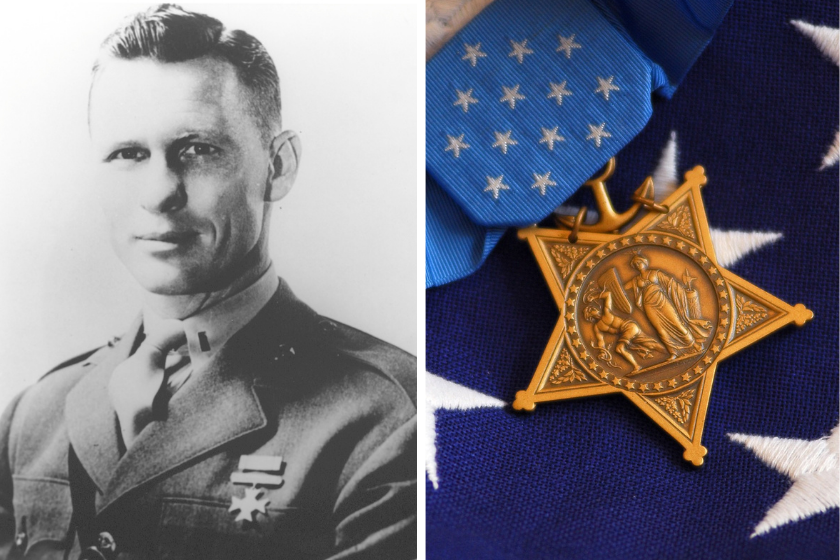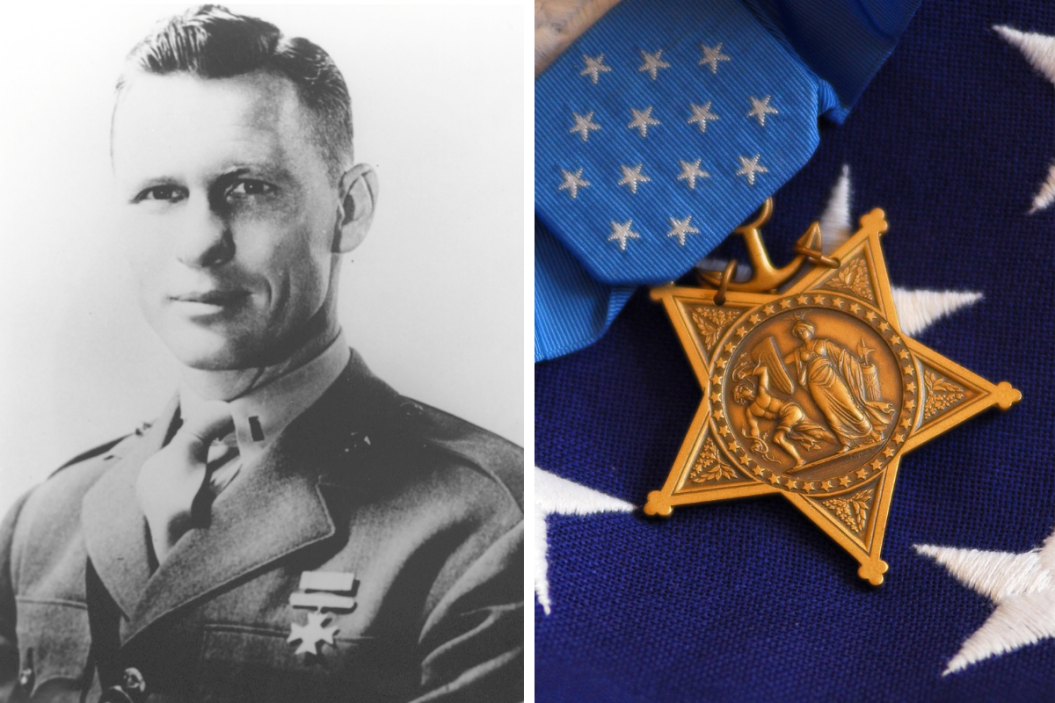In the 1941 NFL season, Andrew Jackson Lummus Jr. made one reception for the New York Giants for a whopping five yards. But that was fine, as Lummus wasn't a receiver. He played nine games at End that year in the NFL. Prior to that professional career, Jack Lummus was a standout high school athlete and then attended Texas Military College. It was there that he was able to earn a scholarship to attend Baylor University.
Aside from being a football player at Baylor, Lummus also played as a center fielder. Lummus was a two-sport athlete at Baylor. He was named a three-time All-American for the Bears baseball team, as well as once for the Baylor football team. But the Ennis, Texas native is better known for what happened after that first professional season in the NFL.
Jack Lummus: American Athlete and Military Hero

Left: This photo is in the Public Domain, Right: Photo by Mass Communication Specialist 1st Class Brandan W. Schulze/U.S. Navy via Getty Images
Lummus had dropped out of Baylor to join the Army Air Corps, but wasn't able to make it as a pilot. He bounced from school to the Army to minor league baseball to the NFL before finding his true calling.
The Giants made the Championship game in that '41 season, and that game was played merely two weeks after the horrible attack on Pearl Harbor. Shortly after, Lummus decided to enlist, joining the U.S. Marine Corps. Recruit training commenced in San Diego, but Lummus wouldn't stay on the West Coast for too long. While he never graduated from Baylor, he had done enough schooling, two years, to be immediately sent to Officer training at Quantico in Virginia. Soon after he was commissioned as a Second Lieutenant.
World War II had been in full swing for a few years at this point, with the Japanese attack on Pearl Harbor forcing the United States into a fight we were hoping to avoid. It wouldn't be until 1945 that he would see action. First Lieutenant Jack Lummus was part of the first wave on Iwo Jima, executive officer, F Company, Second Battalion, 27th Marines, 5th Marine Division. Just a couple of weeks later, he took command of Company E's third rifle platoon.
It was then that the Texan made the ultimate sacrifice in service of his country. Lummus was one of the first troops on the ground at Iwo Jima. According to the National WWII Museum, Lummus said this to a surgeon at the Fifth division hospital just hours before he died. "I guess the New York Giants have lost the services of a damn good end."
Lummus Receives the Medal of Honor
For his service, Jack Lummus was posthumously awarded a Purple Heart as well as the Medal of Honor, one of only two NFL players to be awarded such an honor.
The ceremony awarding Lummus the medal was done on Memorial Day, 1946, after the war had finally ended. His Medal of Honor Citation reads as:
"For conspicuous gallantry and intrepidity at the risk of his life above and beyond the call of duty as leader of a Rifle Platoon attached to the 2d Battalion, 27th Marines, 5th Marine Division, in action against enemy Japanese forces on Iwo Jima in the Volcano Islands, 8 March 1945. Resuming his assault tactics with bold decision after fighting without respite for 2 days and nights, 1st Lt. Lummus slowly advanced his platoon against an enemy deeply entrenched in a network of mutually supporting positions. Suddenly halted by a terrific concentration of hostile fire, he unhesitatingly moved forward of his front lines in an effort to neutralize the Japanese position. Although knocked to the ground when an enemy grenade exploded close by, he immediately recovered himself and, again moving forward despite the intensified barrage, quickly located, attacked, and destroyed the occupied emplacement. Instantly taken under fire by the garrison of a supporting pillbox and further assailed by the slashing fury of hostile rifle fire, he fell under the impact of a second enemy grenade but, courageously disregarding painful shoulder wounds, staunchly continued his heroic 1-man assault and charged the second pillbox, annihilating all the occupants. Subsequently returning to his platoon position, he fearlessly traversed his lines under fire, encouraging his men to advance and directing the fire of supporting tanks against other stubbornly holding Japanese emplacements. Held up again by a devastating barrage, he again moved into the open, rushed a third heavily fortified installation and killed the defending troops. Determined to crush all resistance, he led his men indomitably, personally attacking foxholes and spider traps with his carbine and systematically reducing the fanatic opposition until, stepping on a land mine, he sustained fatal wounds. By his outstanding valor, skilled tactics, and tenacious perseverance in the face of overwhelming odds, 1st Lt. Lummus had inspired his stouthearted marines to continue the relentless drive northward, thereby contributing materially to the success of his regimental mission. His dauntless leadership and unwavering devotion to duty throughout sustain and enhance the highest traditions of the U.S. Naval Service. He gallantly gave his life in the service of his country."
Lummus is buried at Myrtle Cemetery in Ennis, Ellis County, Texas, a short drive from where he was born. While Lummus never got to see how much his country honors his sacrifice, his legacy lives on. Let us never forget the man who gave up his NFL career to fight for his county.

